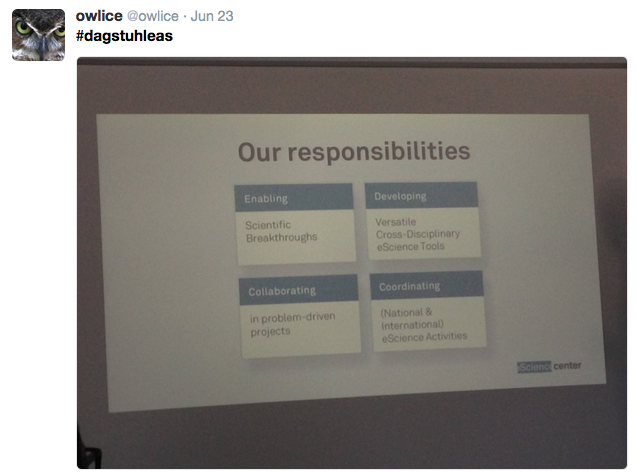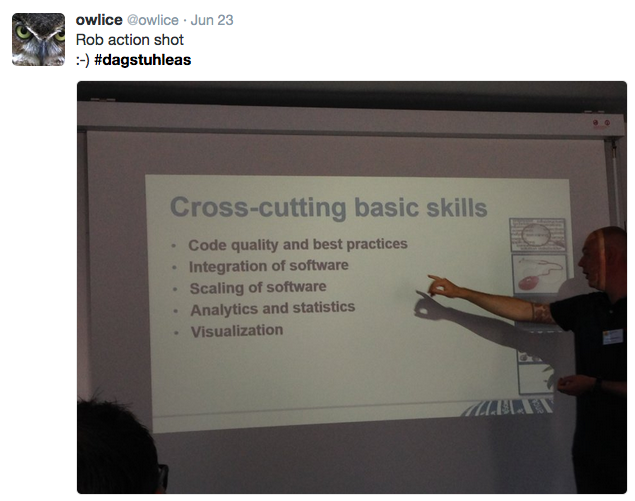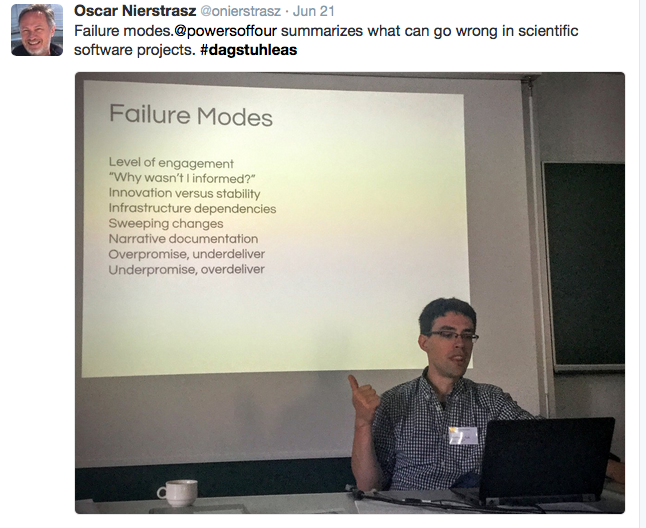The day started with a quick discussion about the afternoon; it is traditional for Schloss Dagstuhl seminars that Wednesday afternoons involve a social activity. It was determined on Tuesday that the activity was to be a hike some distance away from Dagstuhl with dinner after in another town, but several changes to these plans had to be ironed out and announced. After a few minutes spent on that, the morning session got underway and was furiously fast! This was an Open Mic, with participants having signed up while here to give short talks (ten minutes or less).
First up was Daniel Garijo on Software Metadata: Describing “dark software” in Geosciences. By “dark software,” he means that which is often hidden from view. He described the current state of the art for software description in geosciences and demonstrated Ontosoft.org, a semantic registry for scientific software, which currently includes information from several geosciences resources. As Ontosoft is not domain-specific, it has the capacity to expand into other fields as well. This is a very attractive and capable site. It uses a distributed approach to software registries and depends on crowdsourcing for metadata maintenance. The resource organizes software metadata using the OntoSoft ontology along six dimensions: identify software, understand and assess software, execute software, get support for the software, do research with the software, and update the software. Slideshare
Jurgen Vinju was next with Organising a research team around the research software around the research team in software engineering: Motivation, experiences, lessons. He talked about his experiences as the group leader of the SWAT (Software Analysis and Transformation) team at Centrum Wiskunde and Informatica (CWI), the national research institute for math and computer science in the Netherlands. 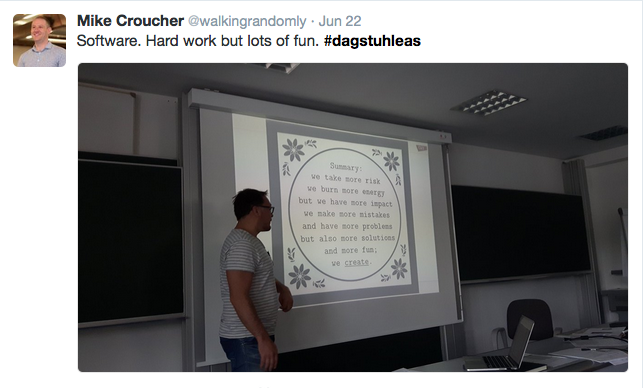 SWAT is all about the source code and supporting programmers to create more efficient, maintainable software. They work to understand and control software complexity to enable more and better tools. He made the point that research teams “prioritise for academic output which is not software.” He showed UseTheSource, a resource developed by CWI with contributions from other institutes and housing open-source projects related to software language engineering and metaprogramming. This allows more efficient programming by automating tasks that are cumbersome or hard, and allows synergies between software engineers, researchers, and industry. PDF
SWAT is all about the source code and supporting programmers to create more efficient, maintainable software. They work to understand and control software complexity to enable more and better tools. He made the point that research teams “prioritise for academic output which is not software.” He showed UseTheSource, a resource developed by CWI with contributions from other institutes and housing open-source projects related to software language engineering and metaprogramming. This allows more efficient programming by automating tasks that are cumbersome or hard, and allows synergies between software engineers, researchers, and industry. PDF

Dan Katz gave an overview of work done by the Force11 Software Citation Working Group; his presentation was titled Software Citation: Principles, Discussion, and Metadata. He provided  rationales for citing software, information on the WSSSPE and Force11 groups involved in developing software citation principles and the process used to develop them, and then the six principles, which focus on the importance of software, the need to credit and attribute the contributions software makes to research and to be able to uniquely identify software in a persistent and specific way, and that citations should enable access to the software and associated information about the software that informs its use. Katz brought up many of the discussions the WSSSPE and Force11 working groups had and their determinations, such as what software to cite, how to uniquely identify software, that peer-review of software is important but not required for citation, and how publishers can help.
rationales for citing software, information on the WSSSPE and Force11 groups involved in developing software citation principles and the process used to develop them, and then the six principles, which focus on the importance of software, the need to credit and attribute the contributions software makes to research and to be able to uniquely identify software in a persistent and specific way, and that citations should enable access to the software and associated information about the software that informs its use. Katz brought up many of the discussions the WSSSPE and Force11 working groups had and their determinations, such as what software to cite, how to uniquely identify software, that peer-review of software is important but not required for citation, and how publishers can help.
 Each of the Open Mic sessions generated immediate discussion during the sessions and while the next presenter was setting up, and this session was no exception. When Katz pointed out that a common practice is to publish and cite papers about software (“software papers”), but that the Importance principle of the Force11 Working Group calls for the citation of the software itself, “on the same basis as any other research product”, this was countered with a comment that people should cite software papers if the software authors have requested that method of citation. Katz stated that could be done in addition to citing to the software, as one of his slides stated. The presentation concluded with information on the next steps for the Force11 Software Citation Working Group — to finalize the principles, and publish and circulate them for endorsement — and the likelihood of a Software Citation Implementation Group being formed to work with institutions, researchers, publishers, and other interested parties to put the principles into practice. PDF
Each of the Open Mic sessions generated immediate discussion during the sessions and while the next presenter was setting up, and this session was no exception. When Katz pointed out that a common practice is to publish and cite papers about software (“software papers”), but that the Importance principle of the Force11 Working Group calls for the citation of the software itself, “on the same basis as any other research product”, this was countered with a comment that people should cite software papers if the software authors have requested that method of citation. Katz stated that could be done in addition to citing to the software, as one of his slides stated. The presentation concluded with information on the next steps for the Force11 Software Citation Working Group — to finalize the principles, and publish and circulate them for endorsement — and the likelihood of a Software Citation Implementation Group being formed to work with institutions, researchers, publishers, and other interested parties to put the principles into practice. PDF
 The fourth Open Mic talk was by Katerena Kuksenok on Best Practices (by any other name). This interesting talk looked at
The fourth Open Mic talk was by Katerena Kuksenok on Best Practices (by any other name). This interesting talk looked at intersections of the technical, social, and cognitive aspects of software engineering in research, and asked how the available community and skill resources could be leveraged. brought together various elements brought up through the workshop so far, including different roles that had been identified, the need for software engineers to learn from scientists just as we hope researchers learn software engineering practices,
intersections of the technical, social, and cognitive aspects of software engineering in research, and asked how the available community and skill resources could be leveraged. brought together various elements brought up through the workshop so far, including different roles that had been identified, the need for software engineers to learn from scientists just as we hope researchers learn software engineering practices,  and overcoming communications barriers. She referred back to a comment Mike Croucher had made in his talk on Monday, agreeing that software engineers should “do CS/SE with people not at them!” PowerPoint
and overcoming communications barriers. She referred back to a comment Mike Croucher had made in his talk on Monday, agreeing that software engineers should “do CS/SE with people not at them!” PowerPoint
After Kuksenok’s talk, I presented Restoring reproducibility: Making scientist software discoverable. This presentation was a quick overview of the ASCL, its history and a few of the changes to our infrastructure, the lessons we learned from  looking at what other astro code registries and repositories had done and what we did with those lessons, and some of the impact we have on the community. As with every other session, there was intermittent discussion, questions asked and answered, and conversation on the topic as I headed back to my chair and the next speaker set up. PowerPoint PDF
looking at what other astro code registries and repositories had done and what we did with those lessons, and some of the impact we have on the community. As with every other session, there was intermittent discussion, questions asked and answered, and conversation on the topic as I headed back to my chair and the next speaker set up. PowerPoint PDF
Robert Haines was up next with A Short* History of Research Software Engineers in the UK (*and probably incomplete). Before there were Research Software Engineers (RSE), there were RSEs going by other names, such as Post Doc and Research Assistant. These were the people in the lab who could code, and fell “foul of publish or perish” because they were writing code rather than papers. RSEs might also have been hiding as those working in high performance computing or as a research group admin. He is an example of someone who has always done RSE work, though was not called an RSE until fairly recently. It was at a Software Sustainability Institute Collaborations Workshop in 2012 that there was a call to arm to recognize the
fell “foul of publish or perish” because they were writing code rather than papers. RSEs might also have been hiding as those working in high performance computing or as a research group admin. He is an example of someone who has always done RSE work, though was not called an RSE until fairly recently. It was at a Software Sustainability Institute Collaborations Workshop in 2012 that there was a call to arm to recognize the  contributions of those who write code rather than papers and are not purely researchers. They decided they needed a name, to unionize, and a policy campaign. He described the current environment, both the challenges and the positives, and shared that many people want to work in this field. Yes, discussion broke out in this session, too! It was remarkable how engaged everyone at the workshop was, and how often and easily discussion took place. PDF
contributions of those who write code rather than papers and are not purely researchers. They decided they needed a name, to unionize, and a policy campaign. He described the current environment, both the challenges and the positives, and shared that many people want to work in this field. Yes, discussion broke out in this session, too! It was remarkable how engaged everyone at the workshop was, and how often and easily discussion took place. PDF
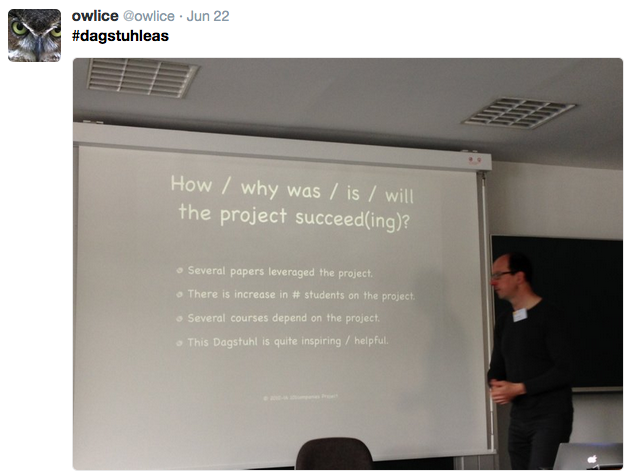 Dan Katz made a very brief presentation and instigated more discussion on career paths when Robert Haines was finished, then after a brief coffee break, the morning Open Mic session continued with Ralf Lämmel‘s presentation intriguingly called Making a failing project succeed?! about the 101Companies project. He called 101Companies a software chrestomathy, from chresto, meaning “useful” and mathein, meaning “to learn.” He shared other chrestomathies, such as the Hello World Collection and the Evolution of a Haskell programmer. (One of the previous links will lead you to a song about a popular beverage.) 101Companies is a resource for learning
Dan Katz made a very brief presentation and instigated more discussion on career paths when Robert Haines was finished, then after a brief coffee break, the morning Open Mic session continued with Ralf Lämmel‘s presentation intriguingly called Making a failing project succeed?! about the 101Companies project. He called 101Companies a software chrestomathy, from chresto, meaning “useful” and mathein, meaning “to learn.” He shared other chrestomathies, such as the Hello World Collection and the Evolution of a Haskell programmer. (One of the previous links will lead you to a song about a popular beverage.) 101Companies is a resource for learning  more about software, for comparing technologies, for programming education, and can serve as “a playground for student projects.” He discussed some of the challenges the project is having and some of the ways in which it is succeeding. PDF
more about software, for comparing technologies, for programming education, and can serve as “a playground for student projects.” He discussed some of the challenges the project is having and some of the ways in which it is succeeding. PDF
The last Open Mic talk of the morning was by Ashish Gehani giving a quick overview of his work on software, including software to make data more manageable, particularly the OCCAM: Object Culling and Concretization for Assurance Maximization project.
The last agenda item for the morning was to discuss the manifesto that is one of the required  outputs for this workshop. This discussion was led by James Howison, who shared the link for the Google Doc that was to become the manifesto, and which was discussed and created in tandem (and wild abandon) by many in the room du
outputs for this workshop. This discussion was led by James Howison, who shared the link for the Google Doc that was to become the manifesto, and which was discussed and created in tandem (and wild abandon) by many in the room du ring the time remaining before lunch. The manifesto is our public declaration, our own call to action. Our work is only beginning at Schloss Dagstuhl; we must put what we have discussed here into practice. We shared other manifestos (manifesti!), determined authorship as opt-in (by adding our names to the author list), and talked about but did not determine where this might be published. I found the creation of this document interesting and inspiring, very much in line with the philosophy of “be the change you want to see in the world.”
ring the time remaining before lunch. The manifesto is our public declaration, our own call to action. Our work is only beginning at Schloss Dagstuhl; we must put what we have discussed here into practice. We shared other manifestos (manifesti!), determined authorship as opt-in (by adding our names to the author list), and talked about but did not determine where this might be published. I found the creation of this document interesting and inspiring, very much in line with the philosophy of “be the change you want to see in the world.”

After getting a good start on the manifesto, we broke for a longer than usual lunch period, after which some took a long hike with a lakeside stop for a refreshing beverage, and some did other things. I took a much-needed nap and then noodled around for a bit in the music room, 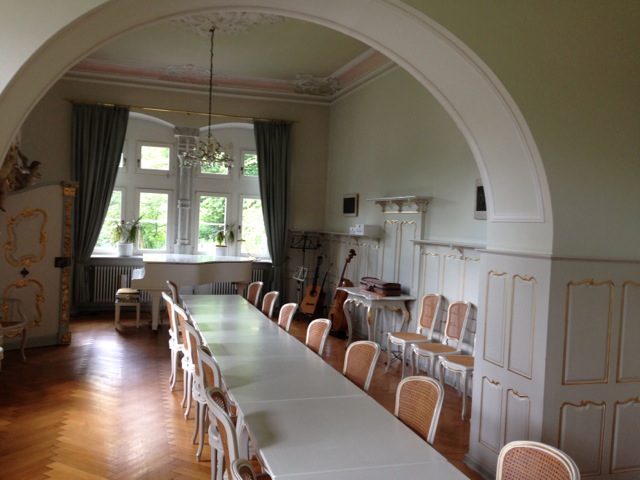 a lovely large, long room with wonderful acoustics and a recently-tuned grand piano, two guitars, a cello, and a violin available. (I discovered later in the week that the violin case also holds a kazoo.)
a lovely large, long room with wonderful acoustics and a recently-tuned grand piano, two guitars, a cello, and a violin available. (I discovered later in the week that the violin case also holds a kazoo.) 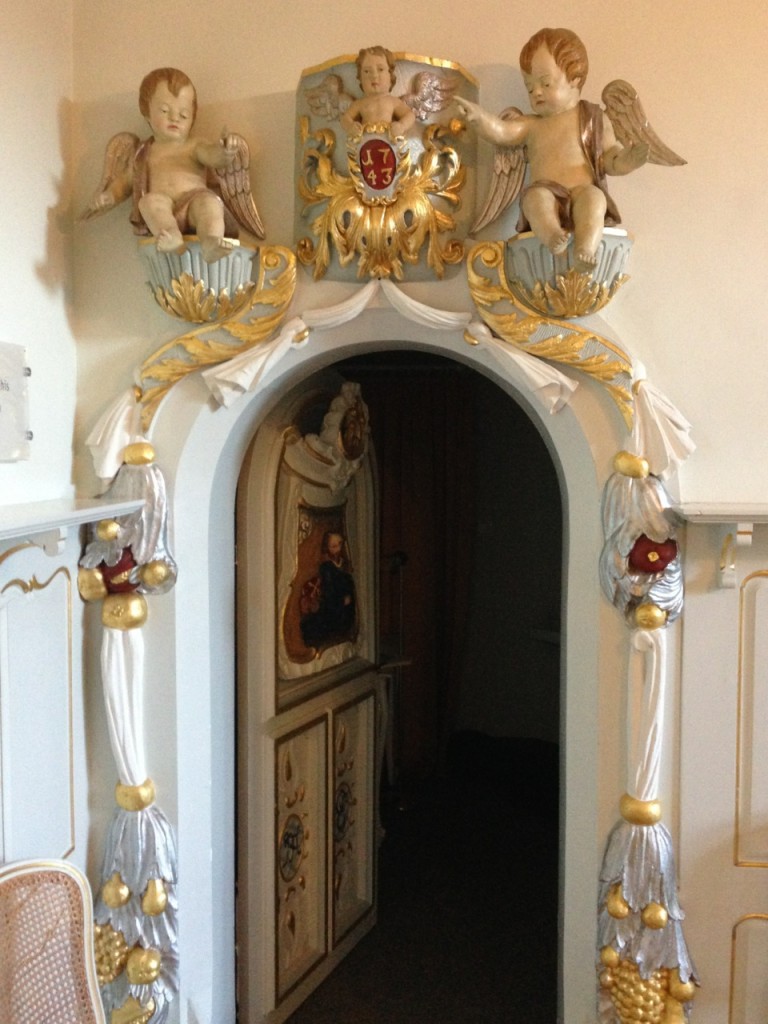 Scores for solo and ensemble music are stocked in a room at one end of the music room, the (small) door to which is watched over by cherubs. Most of the Schloss is modern in appearance; this is one of the few rooms that reveals the building’s history. I found plenty of music to amuse myself with, including a collection of Bach preludes and fugues from the WTC apparently edited by Bartók and in what to me was a confusing order, and Beethoven sonatas that at one time I knew how to butcher. Others reported having taken shorter walks than the one that was organized, listening to podcasts, trying out the bicycles available for guests, and also napping.
Scores for solo and ensemble music are stocked in a room at one end of the music room, the (small) door to which is watched over by cherubs. Most of the Schloss is modern in appearance; this is one of the few rooms that reveals the building’s history. I found plenty of music to amuse myself with, including a collection of Bach preludes and fugues from the WTC apparently edited by Bartók and in what to me was a confusing order, and Beethoven sonatas that at one time I knew how to butcher. Others reported having taken shorter walks than the one that was organized, listening to podcasts, trying out the bicycles available for guests, and also napping.
As you have likely surmised by now, the Twitter hashtag for this event was , and the Twitter feed offers more pictures and information about this workshop.



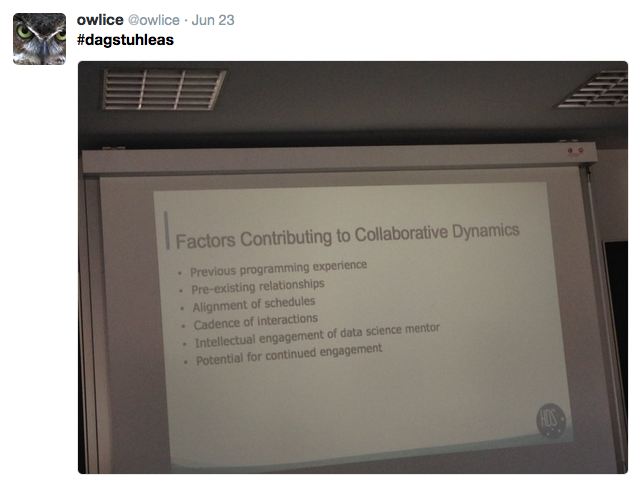 As with all the talks, participants in the room were very engaged, asked questions, and discussed various points. Aragon was asked about career paths and the backgrounds of those in the MS data science program; she said there were forty students in the first cohort and that it was a very heterogenous class, with people from many disciplines. The ethnography work has been discussed in
As with all the talks, participants in the room were very engaged, asked questions, and discussed various points. Aragon was asked about career paths and the backgrounds of those in the MS data science program; she said there were forty students in the first cohort and that it was a very heterogenous class, with people from many disciplines. The ethnography work has been discussed in 

